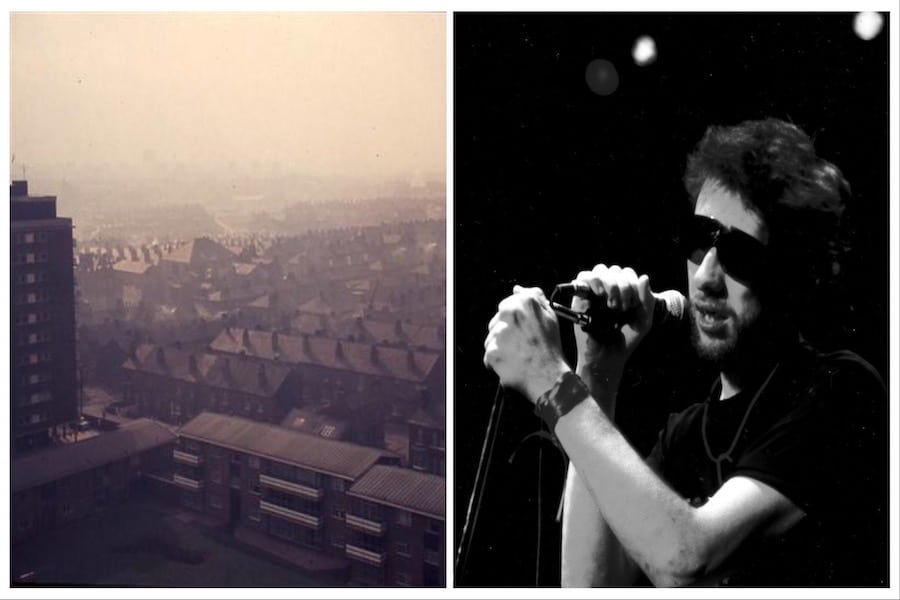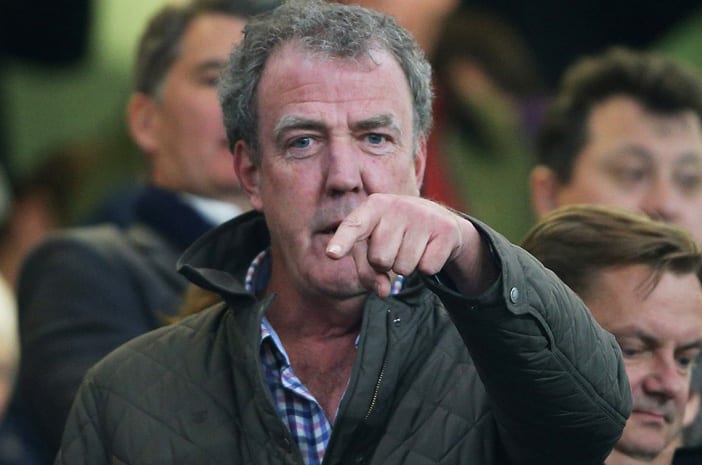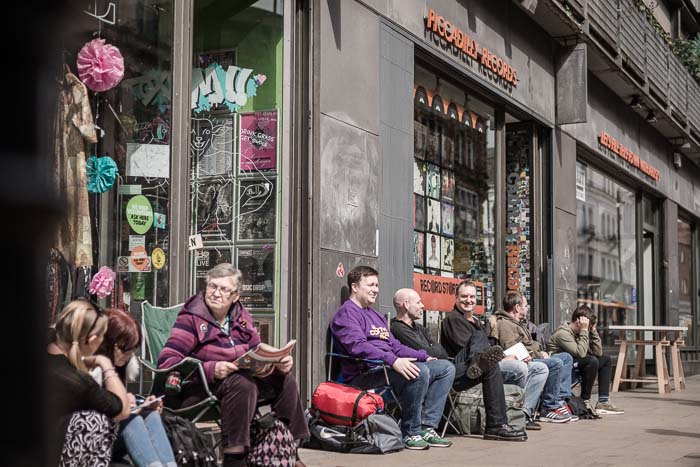Shane MacGowan, Ewan McColl and a song about Salford
- Written by Thom Bamford
- Last updated 1 year ago
- City of Salford, Community, Cornerstone, History, People

The world bid goodbye to a musical legend last week, the spectacular, Shane MacGowan.
The man was a legend, and believe it or not, he had a connection to Salford through his music.
Greater Manchester has produced some of the greatest music ever created. No doubt about it and even the most cynical couldn’t deny it.
And Dirty Old Town, written by Ewan MacColl was made even more famous with the passionate and evocative vocals of Shane MacGowan.
Few songs resonate as deeply as “Dirty Old Town.”
In the year 1949, Salford embodied the industrial core of England’s northern regions, characterised by smoky landscapes, a far cry from the contemporary and polished metropolis it has become today.
Presently, it houses major media outlets like the BBC and ITV along its canals, alongside numerous other sophisticated media companies.
While pollution levels may have experienced a more significant decline, Ewan MacColl’s “Dirty Old Town” extended beyond the depiction of the smog prevalent in his hometown.
Originating from the gritty streets of Salford, this anthem has woven itself into the cultural fabric of the region, capturing the essence of urban life and change.
As we reflect on the recent passing of Shane MacGowan, the legendary frontman of the Pogues and a figure connected to the song’s legacy, it becomes imperative to explore the song’s roots, its journey through time, and its enduring relevance.
Salford’s Industrial Past
To understand “Dirty Old Town,” one must delve into Salford’s industrial past.
The song, penned by Ewan MacColl in 1949, paints a vivid picture of the town during the era of industrialisation.
Highlighting the impact of factories, canals, and the working-class struggle, the lyrics reflect the harsh realities faced by the people of Salford.
Ewan MacColl and Folk Revival
Ewan MacColl, a prominent folk singer and political activist, wrote “Dirty Old Town” during a period of folk revival in the mid-20th century.
His lyrics captured the changing landscape of post-war Britain and resonated with a generation seeking a voice for their experiences.
MacColl’s contribution to the folk scene, coupled with the universal themes in his songwriting, secured “Dirty Old Town” as a timeless piece.
Ewan MacColl grew up in a working-class family in Salford, near Manchester. His upbringing and the socio-economic conditions of the time deeply influenced his worldview and his later artistic work. MacColl was a committed socialist and viewed folk music as a means of expressing the struggles and aspirations of the working class.
MacColl became an integral part of the folk music revival in the 1950s and 1960s. He believed in the power of folk music to convey the stories and experiences of ordinary people. Alongside his then-wife Peggy Seeger, MacColl collected and performed traditional folk songs while also writing original material that addressed contemporary social and political issues.
MacColl wrote “Dirty Old Town” in 1949, drawing inspiration from the industrial landscape of Salford.
The song reflects his observations of the changing urban environment during the era of industrialisation. MacColl captured the essence of a town shaped by factories, canals, and the impact of modernisation on the lives of its inhabitants.
The song commences with a gentle tone, even as the imposing features of Salford cast their shadow: “I discovered my love on the gasworks croft / Envisioned a dream by the old canal / I shared a kiss with my girl by the factory wall.”
It evokes a cinematic ambiance with vivid imagery: a train ignites “the night on fire,” and a dock siren wails.
The scent of spring is intertwined with the “Salford wind,” though later, MacColl altered it to “smoky” following the local council’s request (some bands preserve the original lyrics to this day).
As the third verse unfolds, there’s a perceptible shift in mood: “I’m set to forge a keen-edged axe / Gleaming steel, forged in the crucible / We’ll bring you down / Like an ancient lifeless tree.”
Here, the axe serves as a symbol for the Communist Party, and the “dirty old town” becomes emblematic of capitalism, a force the singer ardently desires to dismantle.
The Pogues’ rendition
Fast forward to the 1980s, and “Dirty Old Town” found new life through the Pogues, a band known for their fusion of traditional Irish folk with punk rock.
Shane MacGowans gravelly vocals and the band’s energetic arrangement brought a fresh perspective to the song, breathing new life into its narrative.
The Pogues’ rendition catapulted the song to international acclaim and cemented its place in the pantheon of folk-rock classics.
Shane MacGowan and his musical legacy
Shane MacGowan, the charismatic frontman of the Pogues, left an indelible mark on the music world.
His poetic lyricism and distinctive voice contributed significantly to the band’s success.
As we mourn his recent passing, it is an opportunity to celebrate not only his contributions to “Dirty Old Town” but also his broader impact on the folk and punk genres.
Enduring relevance and cultural impact of Shane MacGowan
“Dirty Old Town” remains more than just a song; it is a cultural touchstone for the people of Salford and Greater Manchester.
Its themes of urban transformation, nostalgia, and resilience resonate across generations, making it a symbol of the region’s identity.
The song has been covered by numerous artists, further solidifying its status as a musical emblem of working-class life.
Salford FC’s use of Dirty Old Town
Salford City Football Club has a unique connection to the song “Dirty Old Town.” The club has adopted the iconic anthem as its unofficial theme song, creating a powerful bond between the team, the fans, and the city’s rich cultural history.
As a semi-professional football club, Salford City FC has risen through the ranks, gaining prominence in recent years. The club’s choice of “Dirty Old Town” as a rallying anthem reflects a deliberate effort to celebrate its local identity and connect with the community. The song, with its origins rooted in the industrial landscape of Salford, resonates with the working-class spirit and the city’s journey of evolution.
The lyrics of “Dirty Old Town” capture not only the challenges of industrial life but also the resilience and pride of the people who call Salford home. By adopting this anthem, Salford City FC embraces the cultural heritage of the region, creating a powerful soundtrack that accompanies the team’s journey on the football field.
For fans of Salford City FC, singing “Dirty Old Town” has become a cherished tradition, a way to express solidarity with the team and celebrate the unique character of their city. It adds a distinctive and meaningful layer to the match-day experience, creating a sense of community and pride that goes beyond the football pitch.
The Evolution of Salford and Manchester
In tracing the history of “Dirty Old Town,” we uncover not just a song but a sonic time capsule that encapsulates the evolution of Salford and Greater Manchester.
It was even voted one of the greenest places in the UK last year.
From Ewan MacColl’s poignant lyrics to the Pogues’ spirited rendition, the song continues to bridge the past with the present.
As we remember Shane MacGowan, let us acknowledge the enduring legacy of “Dirty Old Town” and its profound impact on the cultural landscape of this dynamic and resilient region.
You can find out more about Shane MacGowan and the Pogues by clicking here
- This article was last updated 1 year ago.
- It was first published on 4 December 2023 and is subject to be updated from time to time. Please refresh or return to see the latest version.
Did we miss something? Let us know: press@ilovemanchester.com
Want to be the first to receive all the latest news stories, what’s on and events from the heart of Manchester? Sign up here.
Manchester is a successful city, but many people suffer. I Love Manchester helps raise awareness and funds to help improve the lives and prospects of people across Greater Manchester – and we can’t do it without your help. So please support us with what you can so we can continue to spread the love. Thank you in advance!
An email you’ll love. Subscribe to our newsletter to get the latest news stories delivered direct to your inbox.
Got a story worth sharing?
What’s the story? We are all ears when it comes to positive news and inspiring stories. You can send story ideas to press@ilovemanchester.com
While we can’t guarantee to publish everything, we will always consider any enquiry or idea that promotes:
- Independent new openings
- Human interest
- Not-for-profit organisations
- Community Interest Companies (CiCs) and projects
- Charities and charitable initiatives
- Affordability and offers saving people over 20%
For anything else, don’t hesitate to get in touch with us about advertorials (from £350+VAT) and advertising opportunities: advertise@ilovemanchester.com



Review: Kim’s Convenience at HOME is ‘a moving portrait of immigrant sacrifice and success’

“Manchester is not Britain’s second city, it’s the first” – Jeremy Clarkson















